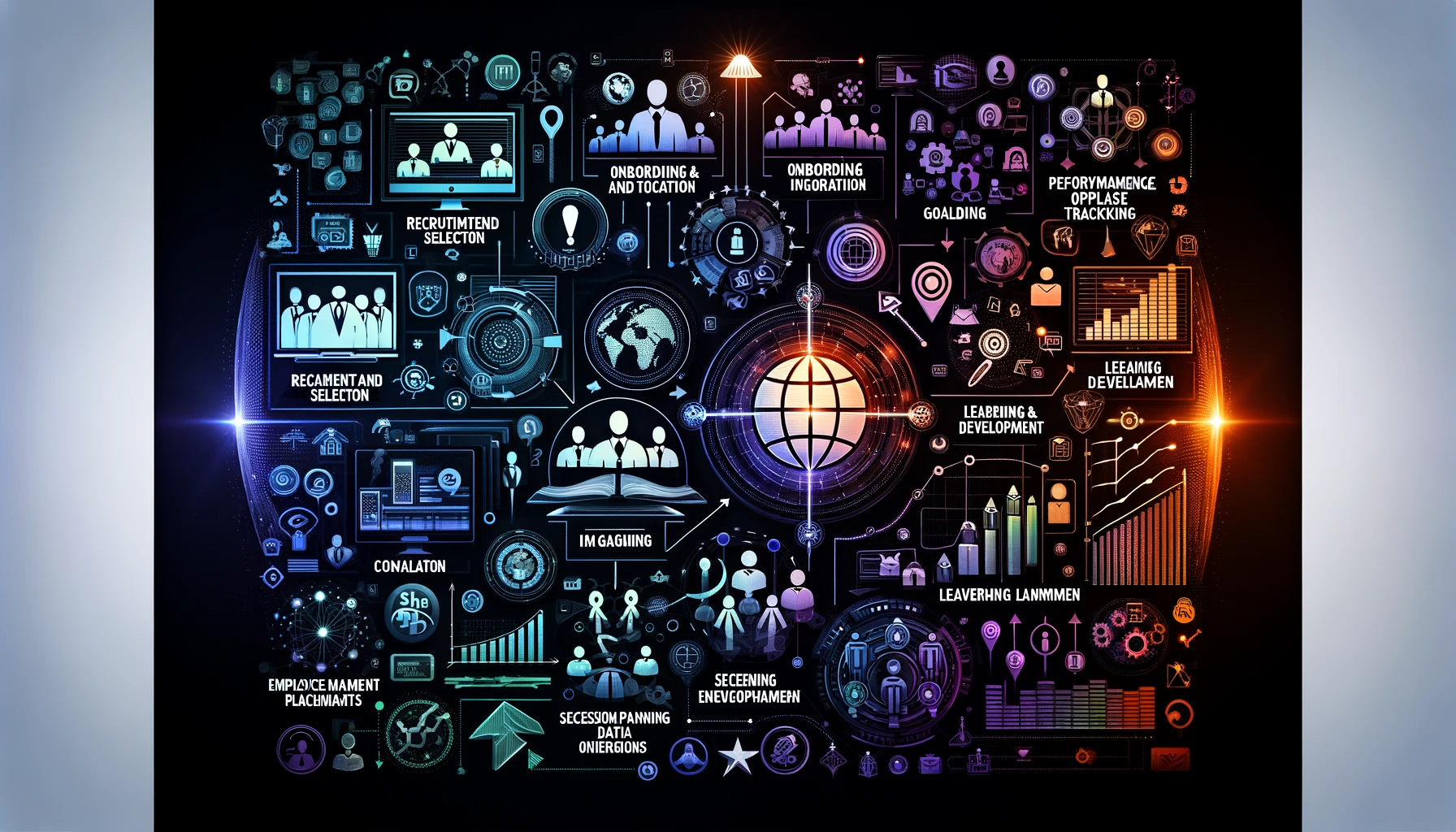Table of Contents
In today’s fast-paced and ever-changing business landscape, organizations are constantly seeking ways to stay ahead of the curve. One crucial aspect of this pursuit is the effective management of talent. Talent Management Systems (TMS) play a pivotal role in enabling organizations to adapt to change swiftly and effectively, ensuring that they remain competitive in a dynamic world.
Talent Management Systems facilitates the seamless integration of various processes involved in talent management, providing a comprehensive framework for identifying, attracting, developing, and retaining top talent. By leveraging technology and data-driven insights, these systems empower organizations to optimize their workforce strategies and respond proactively to shifting market demands.
What is Talent management?
Talent management is the strategic process of attracting, nurturing, and retaining skilled individuals within an organization. It involves activities such as recruitment, training, performance management, and succession planning to align individual talents with organizational goals, ensuring sustained success and competitiveness.

What is a Talent management System?
A talent management system is a sophisticated software platform that facilitates the comprehensive management of an organization’s workforce. It encompasses recruitment, performance assessment, training, succession planning, and employee engagement. By centralizing data and automating processes, these systems empower HR teams to strategically nurture talent, aligning individual skills with organizational objectives for enhanced productivity and retention.
What are the 7 components of Talent management?
- Recruitment and Selection: Talent Management Systems (TMS) revolutionize recruitment and selection. They enable HR teams to post job openings online across various platforms, such as LinkedIn or Indeed, reaching a broader pool of candidates. Applicant tracking systems (ATS) within TMS simplify the management of applications, allowing recruiters to efficiently track candidate progress throughout the hiring process. Automated screening tools integrated into TMS help to quickly identify qualified candidates by scanning resumes for specific keywords or criteria, saving time and effort for recruiters. Overall, TMS streamline recruitment and selection processes, making them more efficient and effective.
- Onboarding and Integration: Onboarding and integration systems streamline the process of integrating new hires into an organization. For instance, they may include digital platforms where new employees can access orientation materials, training modules, and company policies. These systems can also automate administrative tasks such as paperwork completion and IT setup, allowing HR teams to focus on providing personalized support to new hires. Additionally, they may feature social networking functionalities to help new employees connect with colleagues and mentors, fostering a sense of belonging and accelerating their ability to contribute effectively to the organization.
- Performance Management: Performance Management within Talent Management Systems (TMS) empowers organizations to set clear goals and provide continuous feedback. For instance, TMS like Workday or SAP SuccessFactors facilitates goal setting where managers and employees can align objectives. Regular check-ins and feedback sessions are enabled through features like performance reviews or 360-degree feedback tools, aiding in ongoing evaluation. TMS also often offers analytics dashboards to track progress, identify areas for improvement, and recognize achievements. For instance, if an employee’s goal is to increase sales by 10%, TMS can track their sales metrics in real-time, allowing managers to provide feedback and support as needed.
- Learning and Development: Learning and Development initiatives are crucial for employee growth and retention. Talent Management Systems (TMS) enable organizations to offer personalized learning opportunities and development plans. For instance, TMS can analyze employees’ skills, interests, and career aspirations to recommend relevant training courses or certifications. This personalized approach ensures employees receive training aligned with their individual needs, boosting engagement and performance. Additionally, TMS can track employees’ progress and provide feedback, facilitating continuous learning and development tailored to their unique goals within the organization.
- Succession Planning: Succession planning with Talent Management Systems (TMS) involves identifying employees with leadership potential and creating development paths. For instance, a TMS might track performance data to identify top performers, provide training opportunities tailored to their career goals, and create succession pipelines for critical roles. With features like skill assessments and career path mapping, TMS enables organizations to groom future leaders and ensure seamless transitions when key personnel leave or advance within the company.
- Employee Engagement: Talent Management Systems (TMS) facilitate employee engagement through features like communication tools and recognition programs. For instance, TMS might include chat platforms or feedback mechanisms where employees can openly communicate with their peers and managers, fostering a culture of transparency and collaboration. Additionally, TMS often offers recognition features such as employee appreciation boards or reward systems, which acknowledge and celebrate employee achievements. These practices contribute to higher levels of employee satisfaction and engagement, as employees feel valued and connected to their work and colleagues. Consequently, improved engagement leads to higher retention rates, as employees are more likely to remain loyal to companies that prioritize their well-being and development. Moreover, engaged employees tend to be more productive, as they are motivated to contribute their best efforts to the organization’s goals. Overall, TMS plays a crucial role in nurturing a positive work environment conducive to employee engagement, retention, and productivity.
- Data Analytics and Insights: Talent Management Systems (TMS) leverage data analytics to offer valuable insights into various aspects of workforce management. For instance, they can analyze employee performance metrics, such as productivity, efficiency, and goal achievement. Additionally, TMS can track workforce trends, such as turnover rates or skill gaps, enabling HR professionals to anticipate and address potential challenges. Moreover, by identifying areas for improvement, TMS facilitates strategic planning, allowing organizations to allocate resources effectively and implement targeted interventions for enhanced talent development and retention.

How Does a Talent Management Software Work?
Talent management software streamlines HR processes by tracking, storing, and securing employee data to aid in their development, performance improvement, and satisfaction. Key functionalities include:
- Strategic planning: Aligns talent management strategies with organizational goals for long-term success.
- Recruitment: Manages the entire hiring process, from candidate sourcing to offer acceptance.
- Onboarding: Facilitates paperless onboarding and ensures a positive experience for new hires.
- Performance management: Tracks employee performance and facilitates action planning for continuous growth.
- Compensation design: Develop precise compensation models to reward top performers.
- Employee retention: Provides engaging learning experiences and recognition initiatives to boost retention rates.
Why a Talent Management System is Essential?
- Employee Learning Enhancement: Talent management systems foster continuous learning among employees, ensuring they stay updated with relevant knowledge and skills. This reduces the need for constant supervision and enhances overall company performance.
- Employee Productivity Monitoring: By tracking employee performance and identifying areas for improvement in real-time, talent management systems enable timely intervention to rectify mistakes and enhance productivity, replacing the outdated annual evaluation process.
- Effective Talent Acquisition: Utilizing talent acquisition software streamlines the hiring process, enabling organizations to identify and recruit top talents efficiently. This ensures that only the most competent individuals are hired, leading to enhanced company performance.
- Comprehensive Staff Support: Talent management systems provide a platform for employees to share feedback, concerns, and ideas, facilitating effective communication and support from management. From evaluation to retirement, this system enables personalized support and benefits administration, contributing to employee satisfaction and retention.

Maximizing Organizational Success Through Talent Management Systems
In today’s dynamic business landscape, Talent Management Systems (TMS) are indispensable tools for organizations striving to maintain a competitive edge. By seamlessly integrating various talent management processes, TMS empowers organizations to identify, develop, and retain top talent effectively. From recruitment and onboarding to performance management and employee engagement, TMS streamlines HR operations and optimizes workforce strategies. Moreover, with data-driven insights and analytics capabilities, TMS enables proactive decision-making, ensuring alignment with organizational goals and responsiveness to market demands. As a result, TMS not only enhances employee learning and productivity but also facilitates effective talent acquisition and comprehensive staff support, ultimately driving sustained success and organizational excellence.